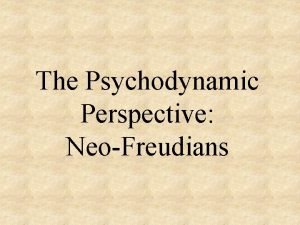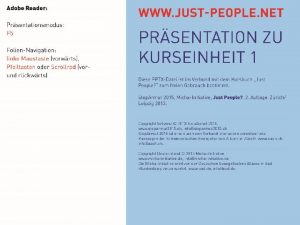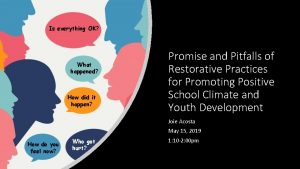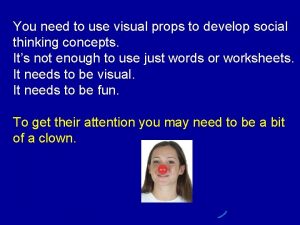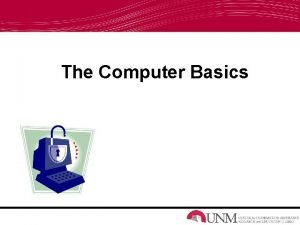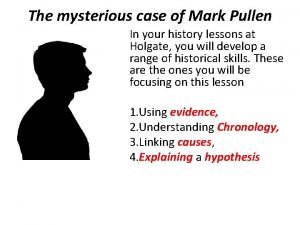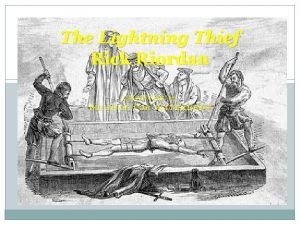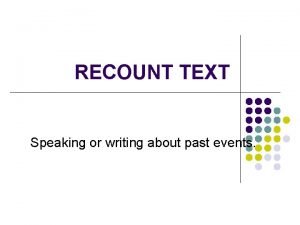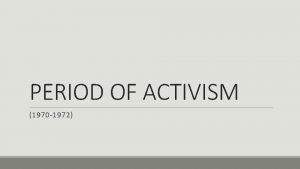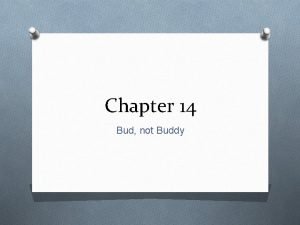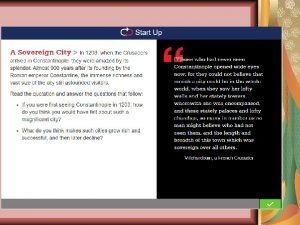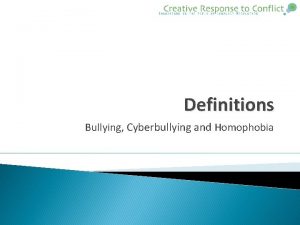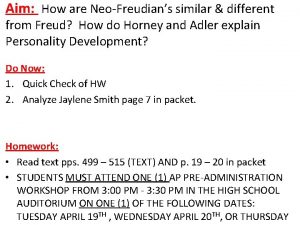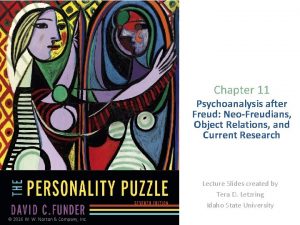Freud is Dead What happened next NeoFreudians People

































































- Slides: 65


Freud is Dead

What happened next? • Neo-Freudians – People who continued to develop psychoanalytic theory • • Carl Jung Alfred Adler Karen Horney Erick Erikson

Alfred Adler

Feelings of Inferiority

Two basic ways to deal with feelings of inferiority Striving for superiority to attain completion Feelings of Inferiority Striving for personal superiority

The path is largely determined in the first five years of life Striving for superiority to attain completion Feelings of Inferiority Striving for personal superiority

Birth Order • • First born Middle child Last born Only child • Each one has unique environments that they are exposed too

Birth Order First Born At the start was the center of attention. The “queen” of the house

Birth Order First Born “Dethroned monarch” Forced to share parental affection If parents have prepared child – will deal better with this change

Birth Order First Born Understands the importance of power Highly supportive of authorities Conservative and conforming Will attempt to regain “power” later in life (inferiority)

Birth Order Middle Children Views older child as a competitor

Birth Order Middle Children Views older child as a competitor If older child is supportive of younger attempts to excel, healthy development is more likely

Birth Order Middle Children Views older child as a competitor If older child is supportive of younger attempts to excel, healthy development is more likely If older is not supportive (mean), middle child might always set unrealistically high goals (ensuring failure)

Birth Order Last born “Baby” – tends to get most attention

Birth Order Last born If parents spoil child may be at risk for being excessively dependent on others for support and protection Wants to excel, but ultimately fails

Birth Order Only Children No siblings so is likely to be the center of attention

Birth Order Only Children If overly pampered may experience difficulty later in life when he/she learns that they are not universally admired.

Evidence • First born – Feel a loss of power; spend their lives attempting to regain this power through outstanding achievement • Negative correlations between birth order and intellectual performance

Evidence • First born children are overrepresented among • • College students Graduate students Women doctors University faculty World Leaders Members of the U. S. Congress United States presidents – Not among unsuccessful presidential candidates

Evidence • First born – Feel a loss of power; spend their lives attempting to regain this power through outstanding achievement • More likely to challenge “status quo” – “Born to rebel” – Students arrested for civil disobedience are more likely to be first borns

Evidence • First born – Feel a loss of power; spend their lives attempting to regain this power through outstanding achievement • More likely to be Type A – Excessive competitive drive – Strong time urgency – Always try to do more!

Evidence • Youngest child – More likely to be pampered; at risk for being dependent on others • More likely to be alcoholics if they lack social support

Constructive Lifestyle Striving for superiority to attain completion Feelings of Inferiority Striving for personal superiority

Constructive Lifestyle • “Socially useful type” • Parents treated child with respect and consideration • Learn importance of equality and cooperation • Develop goals in accord with social interest – – “Honesty and the best polity” “do unto others as you would have them do unto you” Career choices Treat your family with respect and love

Constructive Lifestyle Striving for superiority to attain completion Feelings of Inferiority Striving for personal superiority Socially Useful Type

Constructive Lifestyle Striving for superiority to attain completion Socially Useful Type Feelings of Inferiority Striving for personal superiority Destructive Lifestyle Ruling Type Getting Type Avoiding Type

Destructive Lifestyle • The Ruling Type • Lack social interest and courage • Strive for superiority by exploiting and harming others • Try to control others to feel powerful • Want to be rulers of other – Spouse – Children – “because I said so!” – Teachers

Destructive Lifestyle • The Getting Type • Passive and make little effort to solve own problems – Rely on others to take care of them • Children of affluent parents who have little awareness of own abilities • Surround self with others willing to do work for them – Usually very charming

Destructive Lifestyle • The Avoiding Type • Lack confidence • Sidestep problems (avoid defeat) • Often daydream and fantasizes that they are superior to others

Constructive Lifestyle Striving for superiority to attain completion Socially Useful Type Feelings of Inferiority Striving for personal superiority Destructive Lifestyle Ruling Type Getting Type Avoiding Type

Psychological Health Constructive Lifestyle Striving for superiority to attain completion Socially Useful Type Feelings of Inferiority Striving for personal superiority Destructive Lifestyle Ruling Type Getting Type Avoiding Type Neurosis

Questionnaire • Treat all people equally. • Am a good listener. • Believe that everyone's rights are equally important. • Give everyone a chance.

Questionnaire • Am committed to principles of justice and equality. • Believe that everyone should have a say. • I don’t take advantage of others.

Evidence Constructive Lifestyle Socially Useful Type Psychological Health

Evidence Constructive Lifestyle • People with high “Social Interest” • • • Socially Useful Type Trustworthy Socially adjusted Nurturing Helpful Less depression and anxiety Less lonely Less narcissistic Less Hostile Greater satisfaction with life Emotionally closer to relatives and friends Less likely to manipulate others More likely to sense love from others Psychological Health

Psychological Health Constructive Lifestyle Striving for superiority to attain completion Socially Useful Type Feelings of Inferiority Striving for personal superiority Destructive Lifestyle Ruling Type Getting Type Avoiding Type Neurosis


Karen Horney

Anxiety!

Anxiety!

Anxiety!

Anxiety! • What makes you anxious? • What about UCS anxiety? • Where does it come from? • What are its effects on personality?

Basic Ideas • Who are you?

Basic Ideas Real Self Everyone has a special set of potentials that can flourish

Basic Ideas Real Self With respect proper support one will see what these potentials are and will be able to express them

Basic Ideas Real Self If one does not receive proper guidance and is treated with a lack of respect, it will cause the person to be alienated from their “real self”

Basic Ideas Real Self Idealized Self Image of self (typically involves images of power and abilities)

Basic Ideas Real Self Idealized Self Image of self (typically involves images of power and abilities)

Basic Ideas Real Self The self as it is at the moment Actual Self Idealized Self

Basic Ideas Anxiety! Real Self The self as it is at the moment Actual Self Idealized Self

Basic Ideas Anxiety! Real Self Actual Self The self as it is at the moment Idealized Self

Basic Ideas Anxiety! Real Self Idealized Self

Basic Anxiety • In children – the feeling of being isolated and helpless in a potentially hostile world

Anxiety • Basic Anxiety • Anxiety created from differences between real and idealized self

Coping with Anxiety • Three basic trends • Compliant types • Aggressive types • Detached types

Compliant types • “Moving towards people” • Need to be liked, wanted, loved, and protected by others • Neurotic need for affection • Neurotic need for a partner to take over one’s life • Neurotic need to restrict one's life within narrow borders

Aggressive Types • “Moving against people” • Believe others are untrustworthy and hostile – try to be tough • • Neurotic need for power Neurotic need to exploit others Neurotic need for social recognition Neurotic need for admiration

Detached Types • “Moving away from people” • Self-sufficiently and perfection • Neurotic need for independence • Neurotic need for perfection

Development • Both basic anxiety and the difference between real and idealized are influenced by parents. • Why?

• I cannot stand to lose an argument. • I compete with others even if they are not competing with me. • When my competitors receive rewards for their accomplishments I feel envy. • If I can disturb my opponent in some way in order to get the edge in competition, I will do so

• I like the challenge of getting someone to like me who is already dating someone else. • It is a dog-eat-dog world. If you do not get the better of others, they will surely get the better of you. • I find myself turning a friendly game or activity into a serious contest or conflict.

• People who quit during competition are weak. • I find myself being competitive even in situations that do not call for competition. • Without the challenge of competition I might never discover that I had certain potentials or abilities.

Parents • Culture • Hypercompetitiveness – The need to compete and win to avoid losing at any cost

Evidence • Hypercompetitiveness • The core for basic anxiety in America – Extremely hypercompetitive individuals likely grew up in families with parents also with this trait • Will likely lead to neuroticism
 Neofreudians
Neofreudians X.next = x.next.next
X.next = x.next.next Juan soriano la niña muerta; the dead girl; dead infant
Juan soriano la niña muerta; the dead girl; dead infant Recovery community
Recovery community Justpeople
Justpeople What is a characteristic of people media?
What is a characteristic of people media? What is the meaning of where is the love by black eyed peas
What is the meaning of where is the love by black eyed peas анастасия из асторы
анастасия из асторы What happened is everything ok
What happened is everything ok Summary of alien and sedition acts
Summary of alien and sedition acts Udinus learnsocial
Udinus learnsocial What happened to explode1
What happened to explode1 Summary of chapter 7 of the great gatsby
Summary of chapter 7 of the great gatsby What happened to lewis and clark
What happened to lewis and clark Cliff baxter
Cliff baxter What do you think has just happened in these photos
What do you think has just happened in these photos Parts of computer
Parts of computer Chapter 8 and 9 lord of the flies
Chapter 8 and 9 lord of the flies All these things happened to them as examples
All these things happened to them as examples Act 4 scene 4 romeo and juliet
Act 4 scene 4 romeo and juliet Romeo and juliet act 4 script
Romeo and juliet act 4 script Chapter 18 summary hatchet
Chapter 18 summary hatchet What happened to sanctuary
What happened to sanctuary What happened to mark pullen
What happened to mark pullen Slidetodoc download
Slidetodoc download Who is mrs.sleet in bud not buddy
Who is mrs.sleet in bud not buddy What happened on the fifth of november
What happened on the fifth of november Dred scott vs. sandford 1857
Dred scott vs. sandford 1857 How does annabeth pay for the trip to los angeles?
How does annabeth pay for the trip to los angeles? How did the writer feel about this experience she felt
How did the writer feel about this experience she felt What did mildred regret losing in the fire
What did mildred regret losing in the fire Parts of the ffa emblem
Parts of the ffa emblem What happened after the battle of marathon
What happened after the battle of marathon What happened in this picture
What happened in this picture What happened on august 23 1939
What happened on august 23 1939 Period of activism in philippine literature
Period of activism in philippine literature What happened to simon in lord of the flies chapter 9
What happened to simon in lord of the flies chapter 9 What happened after hitler came to power
What happened after hitler came to power Stuff that happened in 2001
Stuff that happened in 2001 What happened 8 years ago today
What happened 8 years ago today Zhaunagush meaning
Zhaunagush meaning What happened in 605 bc
What happened in 605 bc What really happened on the first thanksgiving
What really happened on the first thanksgiving What happened to netgrocer
What happened to netgrocer Chapter 14 summary bud not buddy
Chapter 14 summary bud not buddy Alicia and i talking on edna's steps
Alicia and i talking on edna's steps Aztec religion today
Aztec religion today Jerusalem destroyed 607
Jerusalem destroyed 607 The byzantine empire reached its greatest size under
The byzantine empire reached its greatest size under Lord of the flies chapter 11summary
Lord of the flies chapter 11summary The crucible what happened in the woods
The crucible what happened in the woods What happened at the ascension
What happened at the ascension Beverage antenna
Beverage antenna Conjoined twins trishna and krishna
Conjoined twins trishna and krishna Touching spirit bear chapter 11 summary
Touching spirit bear chapter 11 summary Summer loving had me a blast
Summer loving had me a blast 피노키오 once upon a time
피노키오 once upon a time What happened to mollie
What happened to mollie What happened to michelle from the documentary playground
What happened to michelle from the documentary playground What is bullying definition
What is bullying definition The lightning thief chapter 12
The lightning thief chapter 12 What happened to mobile games
What happened to mobile games What are the concerns of the constitutions?
What are the concerns of the constitutions? What happened
What happened Classification of a contract
Classification of a contract Allusions in percy jackson
Allusions in percy jackson
